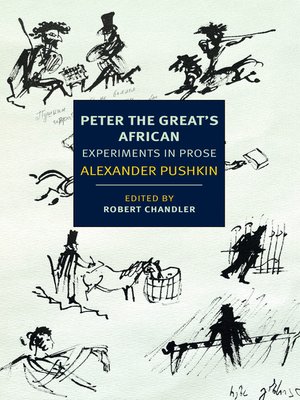
Sign up to save your library
With an OverDrive account, you can save your favorite libraries for at-a-glance information about availability. Find out more about OverDrive accounts.
Find this title in Libby, the library reading app by OverDrive.



Search for a digital library with this title
Title found at these libraries:
| Library Name | Distance |
|---|---|
| Loading... |
Newly translated, unfinished works about power, class conflict, and artistic inspiration by Russia's greatest poet.
Alexander Pushkin, Russia’s foundational writer, was constantly experimenting with new genres, and this fresh selection ushers readers into his creative laboratory. Politics and history weighed heavily on Pushkin’s imagination, and in “Peter the Great’s African” he depicts the Tsar through the eyes of one of his closest confidantes, Ibrahim, a former slave, modeled on Pushkin’s maternal great-grandfather. At once outsider and insider, Ibrahim offers a sympathetic yet questioning view of Peter’s attempt to integrate his vast, archaic empire into Europe. In the witty “History of the Village of Goriukhino” Pushkin employs parody and self-parody to explore problems of writing history, while “Dubrovsky” is both a gripping adventure story and a vivid picture of provincial Russia in the late eighteenth century, with its class conflicts ready to boil over in violence. “The Egyptian Nights,” an effervescent mixture of prose and poetry, reflects on the nature of artistic inspiration and the problem of the poet’s place in a rapidly changing and ever more commercialized society.
Alexander Pushkin, Russia’s foundational writer, was constantly experimenting with new genres, and this fresh selection ushers readers into his creative laboratory. Politics and history weighed heavily on Pushkin’s imagination, and in “Peter the Great’s African” he depicts the Tsar through the eyes of one of his closest confidantes, Ibrahim, a former slave, modeled on Pushkin’s maternal great-grandfather. At once outsider and insider, Ibrahim offers a sympathetic yet questioning view of Peter’s attempt to integrate his vast, archaic empire into Europe. In the witty “History of the Village of Goriukhino” Pushkin employs parody and self-parody to explore problems of writing history, while “Dubrovsky” is both a gripping adventure story and a vivid picture of provincial Russia in the late eighteenth century, with its class conflicts ready to boil over in violence. “The Egyptian Nights,” an effervescent mixture of prose and poetry, reflects on the nature of artistic inspiration and the problem of the poet’s place in a rapidly changing and ever more commercialized society.







